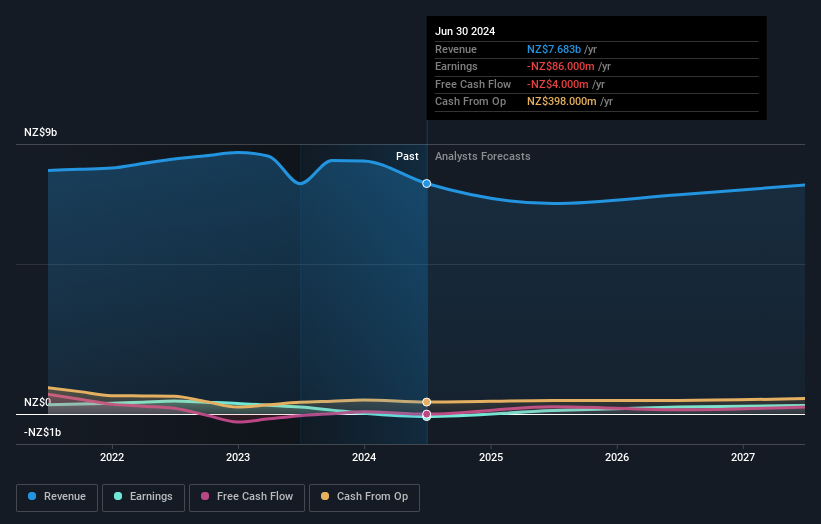- New Zealand
- /
- Building
- /
- NZSE:FBU
Fletcher Building Limited's (NZSE:FBU) market cap touched NZ$2.3b last week, benefiting both retail investors who own 55% as well as institutions

Key Insights
- The considerable ownership by retail investors in Fletcher Building indicates that they collectively have a greater say in management and business strategy
- The top 25 shareholders own 44% of the company
- 45% of Fletcher Building is held by Institutions
If you want to know who really controls Fletcher Building Limited (NZSE:FBU), then you'll have to look at the makeup of its share registry. And the group that holds the biggest piece of the pie are retail investors with 55% ownership. In other words, the group stands to gain the most (or lose the most) from their investment into the company.
Following a 4.3% increase in the stock price last week, retail investors profited the most, but institutions who own 45% stock also stood to gain from the increase.
In the chart below, we zoom in on the different ownership groups of Fletcher Building.
Check out our latest analysis for Fletcher Building

What Does The Institutional Ownership Tell Us About Fletcher Building?
Many institutions measure their performance against an index that approximates the local market. So they usually pay more attention to companies that are included in major indices.
As you can see, institutional investors have a fair amount of stake in Fletcher Building. This suggests some credibility amongst professional investors. But we can't rely on that fact alone since institutions make bad investments sometimes, just like everyone does. If multiple institutions change their view on a stock at the same time, you could see the share price drop fast. It's therefore worth looking at Fletcher Building's earnings history below. Of course, the future is what really matters.

Hedge funds don't have many shares in Fletcher Building. The company's largest shareholder is Orbis Investment Management Limited, with ownership of 15%. With 5.2% and 4.4% of the shares outstanding respectively, Schroder Investment Management Limited and New Zealand Central Securities Depository Limited, Asset Management Arm are the second and third largest shareholders.
On studying our ownership data, we found that 25 of the top shareholders collectively own less than 50% of the share register, implying that no single individual has a majority interest.
Researching institutional ownership is a good way to gauge and filter a stock's expected performance. The same can be achieved by studying analyst sentiments. There are plenty of analysts covering the stock, so it might be worth seeing what they are forecasting, too.
Insider Ownership Of Fletcher Building
While the precise definition of an insider can be subjective, almost everyone considers board members to be insiders. Company management run the business, but the CEO will answer to the board, even if he or she is a member of it.
Most consider insider ownership a positive because it can indicate the board is well aligned with other shareholders. However, on some occasions too much power is concentrated within this group.
Our most recent data indicates that insiders own less than 1% of Fletcher Building Limited. It's a big company, so even a small proportional interest can create alignment between the board and shareholders. In this case insiders own NZ$7.2m worth of shares. Arguably, recent buying and selling is just as important to consider. You can click here to see if insiders have been buying or selling.
General Public Ownership
The general public, who are usually individual investors, hold a substantial 55% stake in Fletcher Building, suggesting it is a fairly popular stock. With this amount of ownership, retail investors can collectively play a role in decisions that affect shareholder returns, such as dividend policies and the appointment of directors. They can also exercise the power to vote on acquisitions or mergers that may not improve profitability.
Next Steps:
While it is well worth considering the different groups that own a company, there are other factors that are even more important. Consider risks, for instance. Every company has them, and we've spotted 1 warning sign for Fletcher Building you should know about.
Ultimately the future is most important. You can access this free report on analyst forecasts for the company.
NB: Figures in this article are calculated using data from the last twelve months, which refer to the 12-month period ending on the last date of the month the financial statement is dated. This may not be consistent with full year annual report figures.
New: AI Stock Screener & Alerts
Our new AI Stock Screener scans the market every day to uncover opportunities.
• Dividend Powerhouses (3%+ Yield)
• Undervalued Small Caps with Insider Buying
• High growth Tech and AI Companies
Or build your own from over 50 metrics.
Have feedback on this article? Concerned about the content? Get in touch with us directly. Alternatively, email editorial-team (at) simplywallst.com.
This article by Simply Wall St is general in nature. We provide commentary based on historical data and analyst forecasts only using an unbiased methodology and our articles are not intended to be financial advice. It does not constitute a recommendation to buy or sell any stock, and does not take account of your objectives, or your financial situation. We aim to bring you long-term focused analysis driven by fundamental data. Note that our analysis may not factor in the latest price-sensitive company announcements or qualitative material. Simply Wall St has no position in any stocks mentioned.
About NZSE:FBU
Fletcher Building
Engages in the manufacture and distribution of building products in New Zealand, Australia, and internationally.
Undervalued with moderate growth potential.
Similar Companies
Market Insights
Community Narratives




